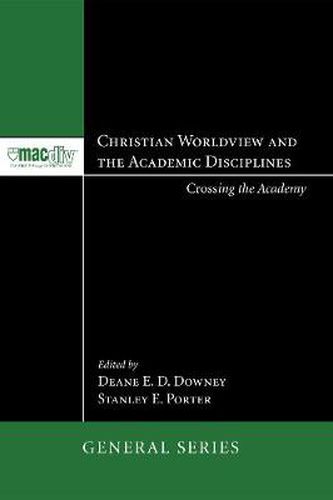Readings Newsletter
Become a Readings Member to make your shopping experience even easier.
Sign in or sign up for free!
You’re not far away from qualifying for FREE standard shipping within Australia
You’ve qualified for FREE standard shipping within Australia
The cart is loading…






This title is printed to order. This book may have been self-published. If so, we cannot guarantee the quality of the content. In the main most books will have gone through the editing process however some may not. We therefore suggest that you be aware of this before ordering this book. If in doubt check either the author or publisher’s details as we are unable to accept any returns unless they are faulty. Please contact us if you have any questions.
This book–an edited compilation of twenty-nine essays–focuses on the difference(s) that a Christian worldview makes for the disciplines or subject areas normally taught in liberal arts colleges and universities. Three initial chapters of introductory material are followed by twenty-six essays, each dealing with the essential elements or issues in the academic discipline involved. These individual essays on each discipline are a unique element of this book. These essays also treat some of the specific differences in perspective or procedure that a biblically informed, Christian perspective brings to each discipline. Christian Worldview and the Academic Disciplines is intended principally as an introductory textbook in Christian worldview courses for Christian college or university students. This volume will also be of interest to Christian students in secular post-secondary institutions, who may be encountering challenges to their faith–both implicit and explicit–from peers or professors who assume that holding a strong Christian faith and pursuing a rigorous college or university education are essentially incompatible. This book should also be helpful for college and university professors who embrace the Christian faith but whose post-secondary academic background–because of its secular orientation–has left them inadequately prepared to intelligently apply the implications of their faith to their particular academic specialty. Such specialists, be they professors or upper-level graduate students, will find the extensive bibliographies of recent scholarship at the end of the individual chapters particularly helpful.
$9.00 standard shipping within Australia
FREE standard shipping within Australia for orders over $100.00
Express & International shipping calculated at checkout
This title is printed to order. This book may have been self-published. If so, we cannot guarantee the quality of the content. In the main most books will have gone through the editing process however some may not. We therefore suggest that you be aware of this before ordering this book. If in doubt check either the author or publisher’s details as we are unable to accept any returns unless they are faulty. Please contact us if you have any questions.
This book–an edited compilation of twenty-nine essays–focuses on the difference(s) that a Christian worldview makes for the disciplines or subject areas normally taught in liberal arts colleges and universities. Three initial chapters of introductory material are followed by twenty-six essays, each dealing with the essential elements or issues in the academic discipline involved. These individual essays on each discipline are a unique element of this book. These essays also treat some of the specific differences in perspective or procedure that a biblically informed, Christian perspective brings to each discipline. Christian Worldview and the Academic Disciplines is intended principally as an introductory textbook in Christian worldview courses for Christian college or university students. This volume will also be of interest to Christian students in secular post-secondary institutions, who may be encountering challenges to their faith–both implicit and explicit–from peers or professors who assume that holding a strong Christian faith and pursuing a rigorous college or university education are essentially incompatible. This book should also be helpful for college and university professors who embrace the Christian faith but whose post-secondary academic background–because of its secular orientation–has left them inadequately prepared to intelligently apply the implications of their faith to their particular academic specialty. Such specialists, be they professors or upper-level graduate students, will find the extensive bibliographies of recent scholarship at the end of the individual chapters particularly helpful.